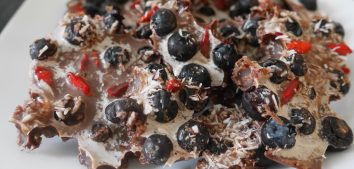
Menu for Your Brain – What Products Should You Eat?
Urgent deadlines at work, looking after kids, taking care of the house or visiting the dentist – you are busy every day, you have many things to remember, and you are affected by various external stimuli, including stress. All these situations put a heavy strain on the brain, which receives, processes, and transmits millions of pieces of information. We often don’t realize how hard it has to work throughout the day, and since you take care of yourself and visit a hairdresser or a beautician, why not take care of the brain? ?
The question is how should we do it? It’s best to start with the simplest things, which is to take a look at what and how you eat, because many of the foods you have in your kitchen support brain function. The first meal of the day is also an important issue that we’ll be focusing on this week as part of the #SmallSteps#BigChange challenge. Below you can find examples of products that help you start your day off right and ideas for habits worth introducing to facilitate the proper functioning of the brain ?
Whole grain products
Glucose is the fuel for the brain, while the source of glucose are carbohydrates. However, that doesn’t mean you need to eat sugar to energize your brain. You should include complex carbohydrates in your diet, which take much longer to digest than simple sugars, thanks to which sugar is released gradually, so that the body, including the brain, can use it well. Complex carbohydrates are found, among others in whole grain products, i.e. wholemeal flour and products made from it (rye bread, whole grain pasta), non-husked rice or buckwheat. In addition, whole grains contain B vitamins as well as minerals such as zinc and magnesium which improve concentration.
Berries
Berries, i.e. strawberries, raspberries, bilberries and blueberries are a valuable source of vitamins such as C, A and B, folic acid, as well as minerals and antioxidants. Antioxidants eliminate free radicals from our body, thus reducing the risk of civilization diseases, delaying the aging process and positively affecting memory. What’s more, folic acid reduces inflammation, it is necessary to maintain the production of neurotransmitters, thanks to which it prevents cognitive disorders, increases the production of red blood cells, and positively affects the oxygenation of the body.
Walnuts
Walnuts resemble the brain for a reason ? They are a source of vitamin E, zinc and magnesium, as well as omega-3 and 6 fatty acids. Moreover, they contain twice as many antioxidants as other nuts. The magnesium contained in them stabilizes the work of the nervous system and improves the work of gray cells. It helps in coping with stress, so it is worth taking care of its adequate supply, because the deficiency of this element causes a feeling of fatigue, irritation and difficulty in maintaining concentration.
Eggs
Eggs are a real nutritional bomb, they are a source of wholesome protein easily absorbed by the body, fat-soluble vitamins (A, D, E and K), as well as B vitamins and minerals such as iron, zinc and selenium. Egg yolk contains lecithins – a mixture of phospholipids and other fatty compounds. In the human body, lecithin is a component of the cell membranes of all cells in the body. The choline contained in lecithin may increase the synthesis of acetylcholine, a neurotransmitter that participates in the transmission of nerve impulses between neurons. Studies have shown that lecithin improves memory, mood and thinking ability in older adults, including patients with Alzheimer’s disease.
Fish and vegetable oils
Fish, especially oily sea fish like salmon, tuna or herring, and vegetable oils such as olive oil, rapeseed oil or linseed oil are valuable sources of omega-3 unsaturated fatty acids, which improve the efficiency of processes related to memory and improve learning ability. In addition, they play an important role in reducing oxidative stress, a condition caused by the accumulation of free radicals that damage the cells and tissues of the body, and consequently contribute to the development of many chronic diseases, including diabetes, heart disease or cancer. In addition, as an anti-inflammatory factor, omega-3 fatty acids counteract the degeneration of neurons, i.e. protect against damage to the cells of the nervous system, in an aging or damaged brain, thus slowing down the decline in mental performance and increasing cognitive functions.
Proper eating habits
Finally, it is also worth paying attention to the basic issues, such not skipping your breakfast and eating regularly, so as not to let glucose drop and thus weaken the body. Also, remember to provide the right amount of water. The brain consists of 83% of it. Water not only cleanses our body but also regulates its work, including the speed of conduction of nerve impulses.
Physical activity
I also encourage you to exercise. It is a well-known fact that sport helps to relieve stress, and after training, serotonin, i.e. the happiness hormone, is produced. However, when you do not feel like intense training or when your head hurts – a quiet walk in the forest, gentle stretching or a yoga session with relaxing music will work just as well. Let me remind you that apart from yoga, you will also find a relaxing Balance function in the Diet & Training by Ann app.

To sum up, there are many foods on the market which contain compounds that benefit the brain. That is why it is worth introducing them to your daily diet to enjoy not only physical but also mental health for many years. Don’t forget about proper eating habits and taking time to relax, as all these factors have a positive effect on the functioning of the body 🙂
Bibliography:
- Chłopicka J. Czy dieta i suplementy mogą wspomóc pracę mózgu? Wszechświat, t. 121, nr 1–3/2020.
- Siepka E., Bobak Ł., Gładowski W. Charakterystyka aktywności biologicznej fosfolipidów żółtka. ŻYWNOŚĆ. Nauka. Technologia. Jakość, 2015, 2 (99), 15 – 28.
- Slutsky I., Abumaria N., WuChao L-J. i in. Enhancement of Learning and Memory by Elevating Brain Magnesium. Neuron, Volume 65, Issue 2, 2010, Pages 143-144.
- Witte A. V., Kerti L., Hermannstädter H. M., Fiebach J. B., Schreiber S. J., Schuchardt J. P., Flöel A. Long-Chain Omega-3 Fatty Acids Improve Brain Function and Structure in Older Adults. Cerebral Cortex, Volume 24, Issue 11, 2014, Pages 3059–3068.









Comments No Comments
Join the discussion…